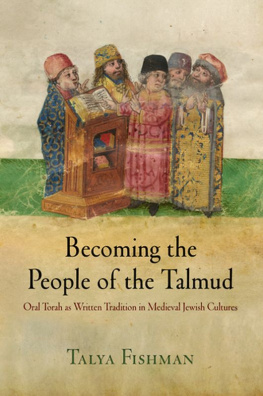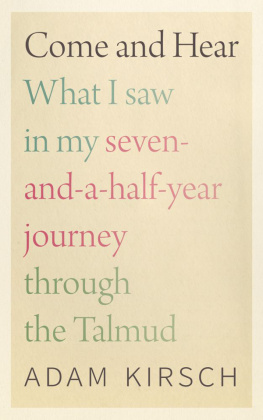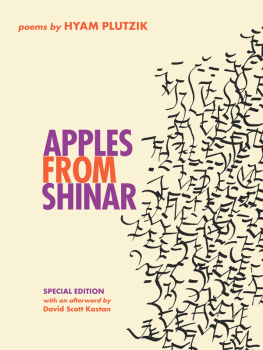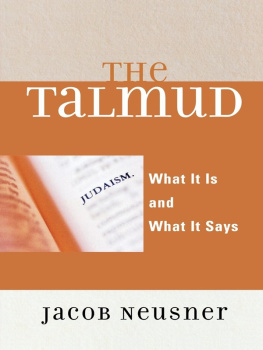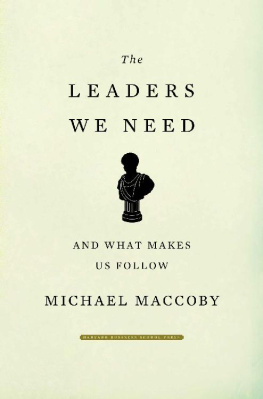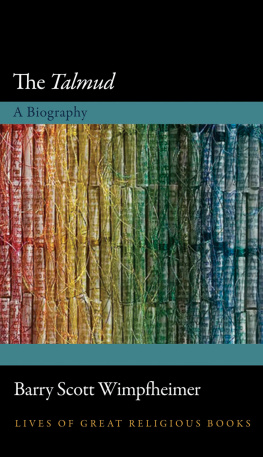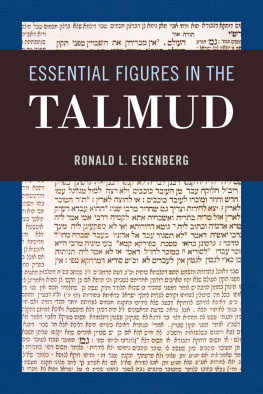THE PHILOSOPHY
OF THE TALMUD
THE PHILOSOPHY
OF THE TALMUD
Hyam Maccoby
First published 2002
by Routledge
2 Park Square, Milton Park, Abingdon, Oxon, OX14 4RN
Simultaneously published in the USA and Canada
by Routledge
270 Madison Ave, New York NY 10016
Routledge is an imprint of the Taylor & Francis Group
Transferred to Digital Printing 2010
2002 Hyam Maccoby
Typeset in Sabon by Mews Photosetting, Beckenham, Kent
All rights reserved. No part of this book may be reprinted or reproduced or utilised in any form or by any electronic, mechanical, or other means, now known or hereafter invented, including photocopying and recording, or in any information storage or retrieval system, without permission in writing from the publishers.
British Library Cataloguing in Publication Data
A catalogue record for this book is available from the British Library
ISBN10: 0-700-71273-9 (hbk)
ISBN10: 0-415-59264-X (pbk)
ISBN13: 978-0-700-71273-1 (hbk)
ISBN13: 978-0-415-59264-2 (pbk)
Publisher's Note
The publisher has gone to great lengths to ensure the quality of this reprint but points out that some imperfections in the original may be apparent.
For Cynthia
CONTENTS
PREFACE AND ACKNOWLEDGEMENTS
To undertake a description of the philosophy of the Talmud may seem to imply too ready an acceptance of the view that the Talmud can be regarded as a unitary literature. The word Talmud, of course, is here being used, as so often, in a rather loose sense, to mean the rabbinic literature, both Tannaitic and Amoraic, and it includes not only the two Talmudim (Palestinian and Babylonian), but also works as diverse as the Mishnah, the Tosefta, the Halakhic Midrashim, the Targumim, the Homiletic Midrashim, the Liturgy and even the mystical Heikhalot literature, all of which feed into the Talmudim. Many scholars would see these works as expressing a number of different Judaisms. My own view is that, while many distinctions and acknowledgments of development and change need to be made (and I hope I have always borne this in mind), there is an underlying unity in the whole corpus, arising from the community of scholarship and thought that it represents. I have made use here of an analogy between the activity of the rabbis and that of the enterprise of modern science. Both enterprises involve the rejection of charismatic authority and the substitution of the co-operation of qualified individuals, all subscribing to a common intellectual ethos, but infinitely tolerant of idiosyncrasy and originality, and capable of unexpected development.
I wrote in the Introduction to my Early Rabbinic Writings (Cambridge University Press, 1988): It is characteristic of this literature that it is presented as the work of an anonymous compiler, bringing together the views of a large number of named rabbis, sometimes reinforcing each other, but more often conflicting without rancour. The total impression is of a corporate literary effort, in which a large number of experts, belonging to successive generations, is engaged in a common enterprise, the clarification of Scripture and the application of it to everyday life. To find a similar type of literary activity in other cultures is not easy. The work of the Alexandrian scholars on Homer and other Greek classical writers is similar in some ways, but very different in others. The nearest analogy is probably the organization of scientific research in modern times: the feeling of comradeship in an an enterprise of great theoretical and practical significance; the background of agreed assumptions, combined with great freedom for difference of opinion among qualified researchers; the submission of views to the criticism of the general body of experts; the acquisition of fame and reputation for individuals, but only within a framework of shared effort, so that no individual can become dominant, or acquire a kind of authority different in kind from that of his fellows.
In the present book, I have developed further the above analogy between rabbinic and scientific thought, as one strand in an approach to an appreciation of Talmudic philosophy. Meanwhile, a similar insight has been developed by Menachem Fisch, in his excellent work Rational Rabbis (Indiana University Press, 1997), to which I have referred a number of times (not always in agreement, yet always with a sense of appreciation of his expertise in both Talmudic studies and in the philosophy of science).
Two books to which I owe a particular debt are Michael Walzer's Exodus and Revolution (1985) and Stuart Cohen's The Three Crowns (1990). Again, I have not always agreed with these authors, but have found their basic insights most helpful and suggestive.
I must express my thanks to Dr. Oliver Leaman, who first encouraged me to embark on the work. Jonathan Price, too, of the Curzon Press has been most understanding and helpful.
My former colleagues and students of the Leo Baeck College, London gave me many opportunities to deepen my understanding of the Talmud in teaching and in discussion. Since my move to the University of Leeds, I have had further such opportunities as Research Professor at the Centre for Jewish Studies, and must particularly thank my colleagues, Dr. Eva Frojmovic and Professor Griselda Pollock for their help and many kindnesses.
Most of all, I must thank my dear wife Cynthia, whose support, constructive criticism, and overcoming of all difficulties made it possible to complete the book.
1
DOES THE TALMUD CONTAIN PHILOSOPHY?
The philosophical stance, as traditionally understood, is one of facing the universe without preconceptions. The philosopher refers to no texts or received doctrines. He even rejects all knowledge derived from science, at least at his starting-point, though his researches, as he progresses, may, or may not, provide a validation for science. The archetypal figure of the philosopher is Descartes, seeking to find the starting point of philosophy by stripping away everything that could possibly be doubted. But Descartes is the heir of the Greek tradition of philosophy, in which the philosopher is an instrument of pure perception turned on the world, which he examines from scratch, rejecting all received notions as hindrances to his quest. Just because philosophy emanated from the lone philosopher contemplating the universe without intermediaries, the focus of enquiry soon became one of epistemology: how reliable was the instrument, the philosopher himself? This is not a turning away from the world to the contemplation of the self but a critique of the self as measuring instrument or point of vantage for the contemplation of the world. He must strip away the fallible senses and find some mode of enquiry that gives undoubted truth; mathematics, perhaps. But wherein lies the the authority of mathematics? Does it all reduce to logic? But is not logic mere tautology? Does the sum of all human enquiry reduce to the proposition A is A? All this is very remote from the atmosphere of the rabbinic writings where instead of the lone philosopher, we have a crowded world.
Again, the process of philosophy, as generally understood, is one of ever-increasing abstraction. The real world, as the Greek atomists understood it, contained no colours, smells or sounds; only a concourse of tiny atoms, which by their combinations and divisions produced the illusion of the colourful, companionable world in which humans live. Greek philosophy turned into the modern science of physics, which contains entities even more remote from human concerns.



